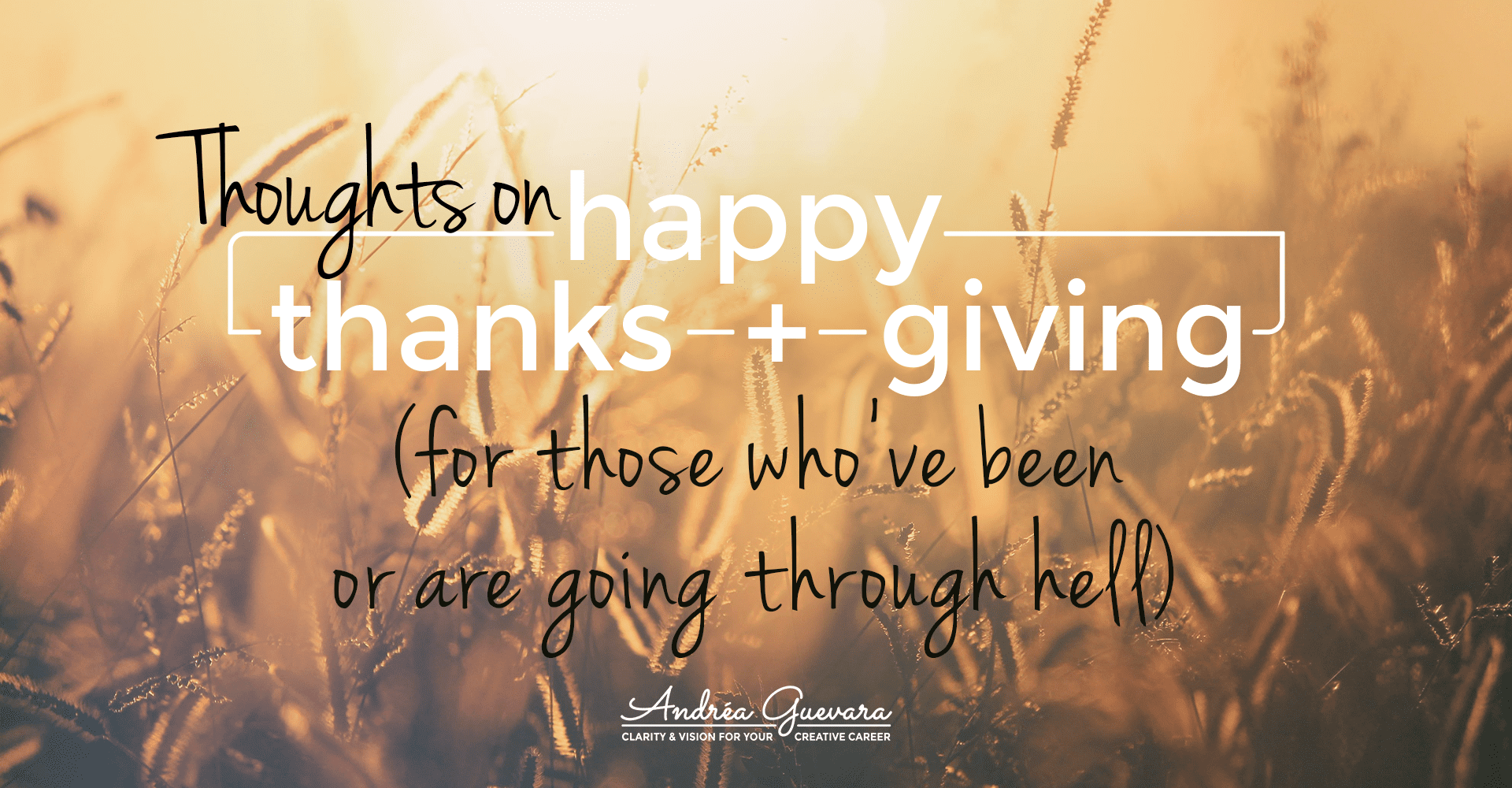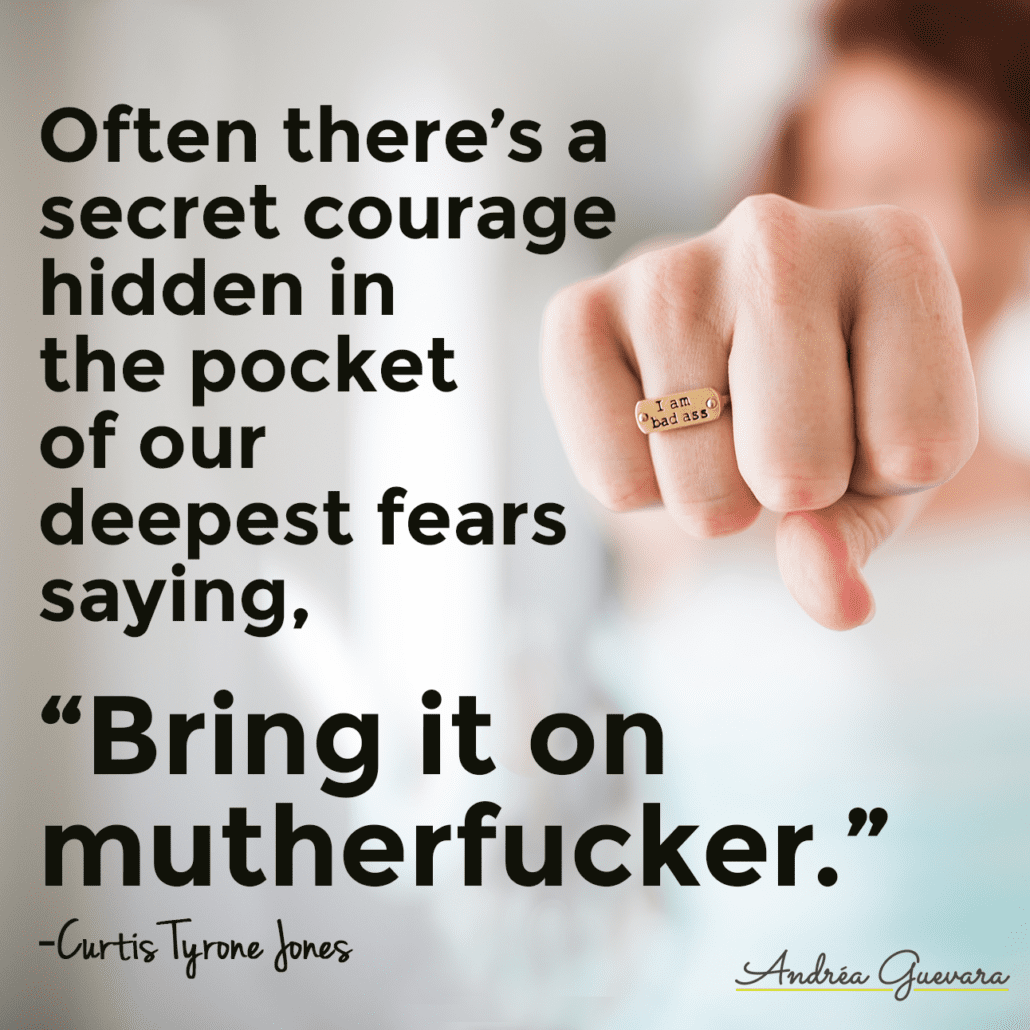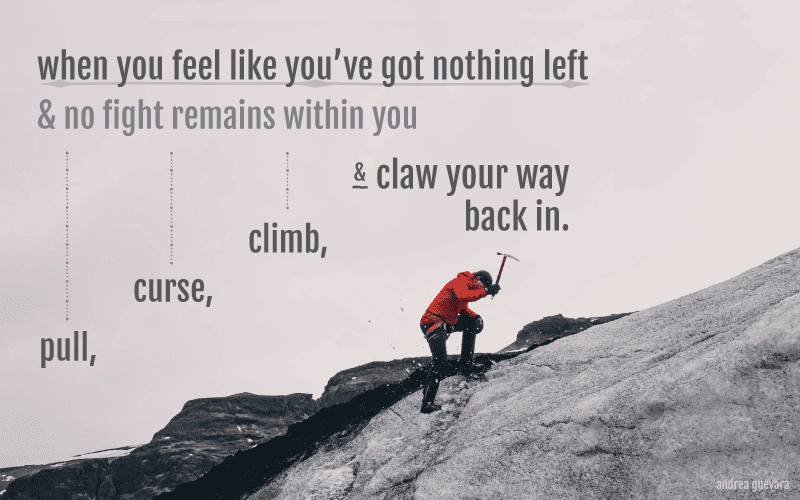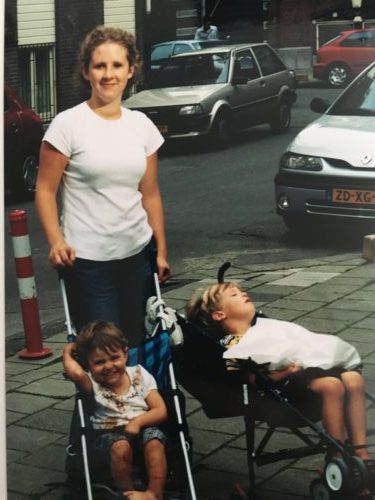Have you ever experienced something like this: Someone you can’t stand gets a win.
You know them to be a [fraud/asshole/full-of-shit/fake/abusive/condescending/fill-in-the-blank nasty trait] and yet they won an award, or got a big client, or a book deal, or whatever. Maybe they even achieved the kind of success YOU want! Dammit. And so you start obsessing over how unfair it is, how awful, crazy, frustrating.

I hear about this phenomenon a lot with writers (and anyone, really). And I’ve totally done it myself.
In fact, I had this experience this week. And it threw me into a short-lived, but miserable spiral. Of course.
To be crystal clear and totally honest, this is usually how shows up in my brain:
#1:.What the fuck?
#2: They’re so full of shit [or mean, or whatever it is]! How does no one else see this?
They’re so [fill in the blank]—they don’t deserve this! OR But they aren’t/didn’t even [ thing you do better, or expect someone to do better in order to earn this ]!
#3: I guess I’m just not [full of shit or fill in blank] enough to make it in this industry. If THAT’S what it takes to be successful, I might as well give up!
#4: Am I crazy that I’m the only one who sees through this person? Maybe I’m wrong, maybe there’s something wrong with me…
#5: Yep, I’ll never make it. Might as well give up. I’m not good enough, not bourgie enough, not strong enough, not determined enough, etc. I’m CURSED and/or DOOMED.
aka I arrive at “I must be worthless/not good enough/ an idiot [fill in blank].”
Or at least that’s how it went for me for many years. Many. Years.
This week, after too many bile-filled hours, I was finally able to shift myself at step number 3.
And call myself on my own bullshit.
The Wheel of Fear
In Fearless Living, a book that really helped me shift my life during my divorce saga, author Rhonda Britten has a name for this shit show: the Wheel of Fear.
Visually, it looks like this (or at least my artistic rendering that is) You’ll see the steps are similar to what I just described:
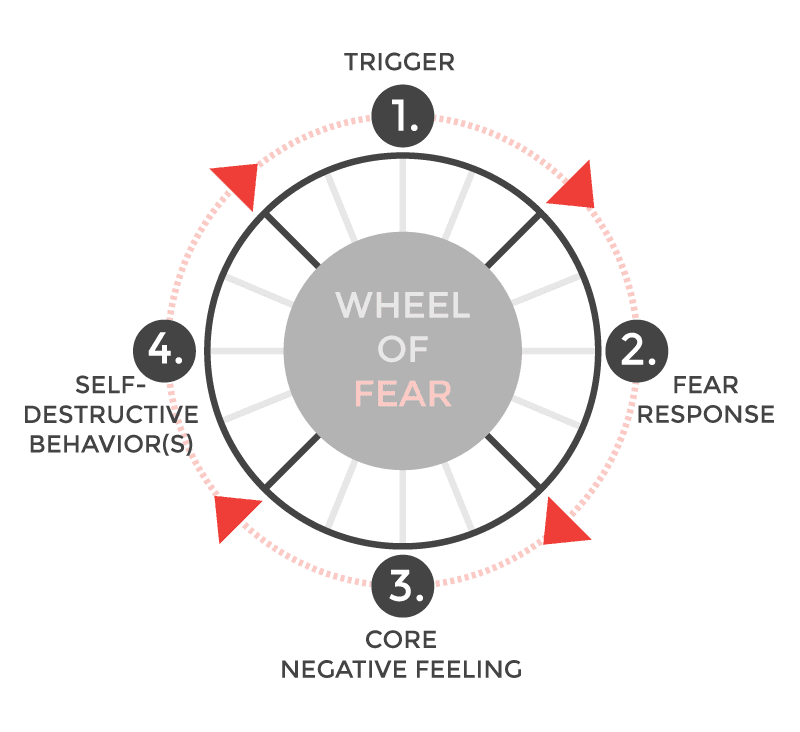
To break that wheel down:
- I/we have a trigger event—the rejection, or the undeserving colleague. Whatever it is that gets your personal goat.
- I start to freak out—not realizing my reaction is based in fear.
- I/we revert into some deep fear (or old behavior) we personally have (different for all of us)—maybe for you it’s abandonment, loss of control, or feeling worthless, or feeling invisible, or something else.
- This leads us to step 4–the things we do when we’re upset: drink, gossip, get depressed, sleep all day, blow off work, eat too much, obsess over the issue, etc.
And what does this do? It ends up triggering us again, because if we’re obsessing over the issue, or drinking too much, or eating a whole box of cookies or whatever, it triggers our fears again, bringing us back to our core fears about our own selves.
The Nasty Realization has the Power to Free Us
As much as we try to push the onus on someone else, our fear and reactions and behaviors really have little to do with that other person—they are all about our own fears about ourselves.
If I’m upset that someone who is dishonest or smarmy is successful, sure on the surface it’s about morals, ethics, how I want the world to be better, but really, it’s because I worry that being myself is never going to be enough.
Mull that over for a moment.
It’s that deep-seated fear that I’m not worthwhile, that I won’t have success because I’m not smarmy. Another layer deeper: that I won’t be accepted or loved for who I am.
Damn it hurts, doesn’t it? Because it’s fucking true.
The Biggest Stumbling Block to Success
This wheel of fear is a real jerk-bag. It’s one of the primary detriments to writers and creatives who are trying to pursue their dreams.
Our art can be deeply personal and rejection, or someone else’s success, can sometimes feel like a threat against the validity of our existence. It’s not pretty, but if we’re honest—pretty much all of us experience this at some point.
Maybe you don’t have the same fears as I do, but I’m willing to bet (Monopoly money of course, don’t get crazy here) that you have some other dark fear then, something that sets you off by whatever a trigger moment looks like for you.
We all have our own personal fear wheels though they might look a little different and be triggered by different events.
The Choice
When I start to feel that Ferriss wheel of drama winding up I still have a choice to stay on, or jump off.
That’s the key: we still have a choice.
I cannot control the things or people around me. I can only control my reaction and actions.
Everyone has different go-to responses that help bust them out of their dirty fear spiral.
One of mine is to ask myself WHY and then keep on digging til I get to the core pain/fear:
- Why am I threatened by this person? (I’m afraid if they can have success then I can’t)
- Is that rational? (not really)
- Why is it making me feel like this? (Because I’m afraid I’m not good enough)
- Is my fear true/valid? (feels like it sometimes, but no)
- Is there enough room in this world for both their success AND mine? (yes)
- What do I know to be true about myself? (I am determined, kind, intelligent, honest) Do you feel how that softens a bit there? Shifting the focus from my fear to who I know myself to be.
If I can understand where my fear is coming from, it’s easier to release it.
Another tactic I use, is to distract myself with something I love. Maybe it’s a good book, a movie, painting, going for a walk. Reminding myself there’s a whole lot more to this world than that dang situation, helps me then be able to ask myself those questions above.
When I’m reeling though, and may not have that opportunity to do something I love, I find that giving myself time to think is key. This is especially good for those of us who struggle with people-pleasing or saying ‘no.’
Maybe that means ducking into the restroom at work for five minutes, or taking ten minutes to meditate, or saying “I’ll have to get back to you.” But sometimes I have to remove myself from the trigger situation and get back to the present. Because guess what? If I’m all up in my head obsessing over this thing, I cannot find a solution.
The solution is pretty much never in the same location as the problem.
Since I’m showing you Rhonda Britten’s oh-so-pertinent Wheel of Fear, I’d like to show you her Wheel of Freedom. This is what a healthier response looks like when you find yourself boarding your tilt-o-whirl-of-fear. But please, please read her WHOLE book on this, because there’s no way I can fully demonstrate the nuances of this approach in a post this short.
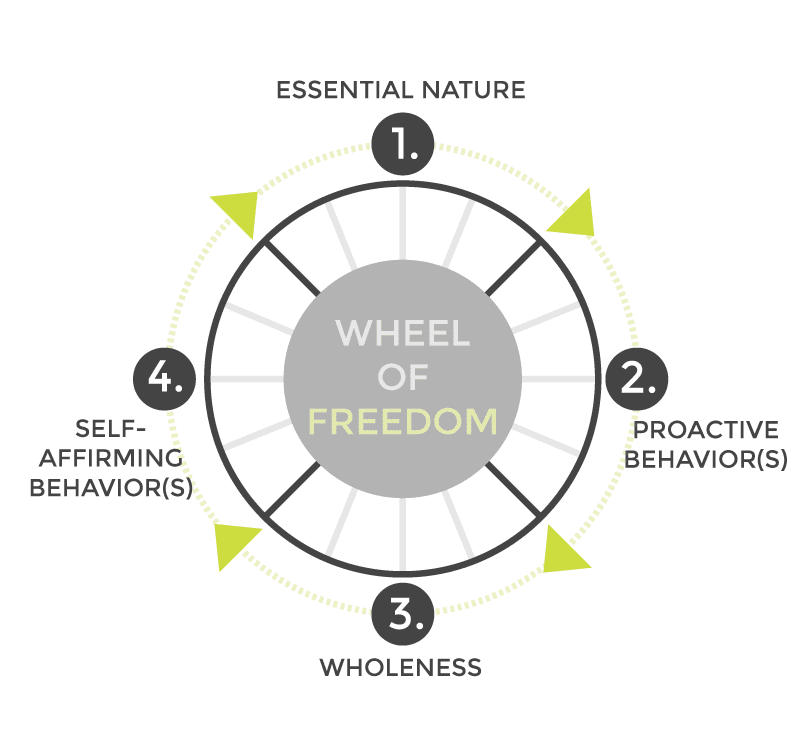
Here’s the basic breakdown:
- When you start to feel the fear grasp your heart with its talons, remind yourself of your essential nature—which is basically the deep-down good person you know you are (even when you don’t always feel like it). This also might just look like reminding yourself of what lights you up, what you truly care about in this life.
- Then you do one of those proactive behaviors I was mentioning above (or rather your own proactive actions) something that gets you in a good place—for me, giving myself time to think, or distracting myself with a healthy behavior, asking myself ‘why’ until I get to the root of the issue, etc.
- And this brings me back to my WHOLENESS. Now I can breathe, now I can go back and approach the situation with behaviors that fit my goals, my ethics, my personality and talents, shedding the negativity of the trigger situation. For me, that involved writing this post. 😉
- This sense of wholeness gives me the power to release the fear and its dirty bag of lies and step back into living my life from a place of love and power, not fear.
Again, this is a simplification of a system that goes into greater depth and breadth, read the book for a deeper more faceted explanation of both wheels as well as a bunch of other potentially life-changing tools.
The Real Shift/Advantage
There’s a lot of judgment and negativity in the writing world and to some degree in creative work and entrepreneurship. I’ll tell ya though, if you really want an advantage—this is it. Being able to feel the fear and move on in a healthy way is priceless. Fear’s grip begins to weaken as your true badassery emerges.
Hey, I’m no angel and I still have my fear spirals (like this week, duh), but I swear this philosophy helps if you do the actual work of it. Give it time and your fear spirals will get shorter and less often.
You’ll find yourself less focused on outside bullshit that you have no control over anyway, and more focused on your badass mission(s) on this earth.
Understanding the Flip Side
Now, I do want to make one more point here. This one’s a little sticky. There’s a flip side to this too. All too often there are also those who hate to see ANYONE succeed, even good people like you and me.
Have you ever experienced that? You get something published, or a big client, or a big win, and someone you considered a friend loathes you for it. I know I have. You can feel that person seething as you claim your win.
Now that you now know that their reaction has nothing to do with you. And everything to do with their own fears and insecurities.
They are firmly on their Wheel of Fear. You cannot change them, that’s up to them. But you can be true to your core, your goodness, your creativity, and compassion for yourself and others, and still kick ass and take names.
So, in the immortal words of Ricky Nelson:
“You see, ya can’t please everyone, so you got to please yourself.”
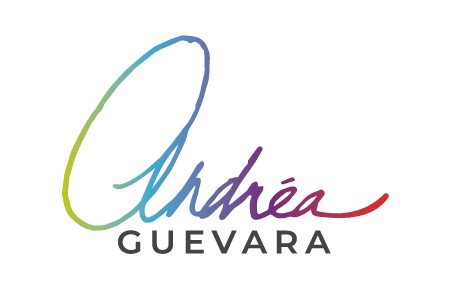
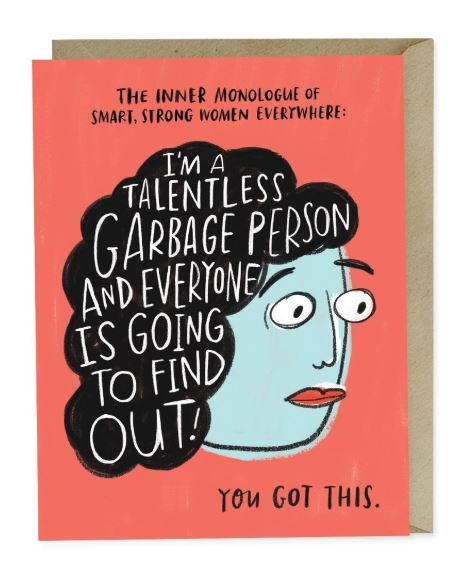
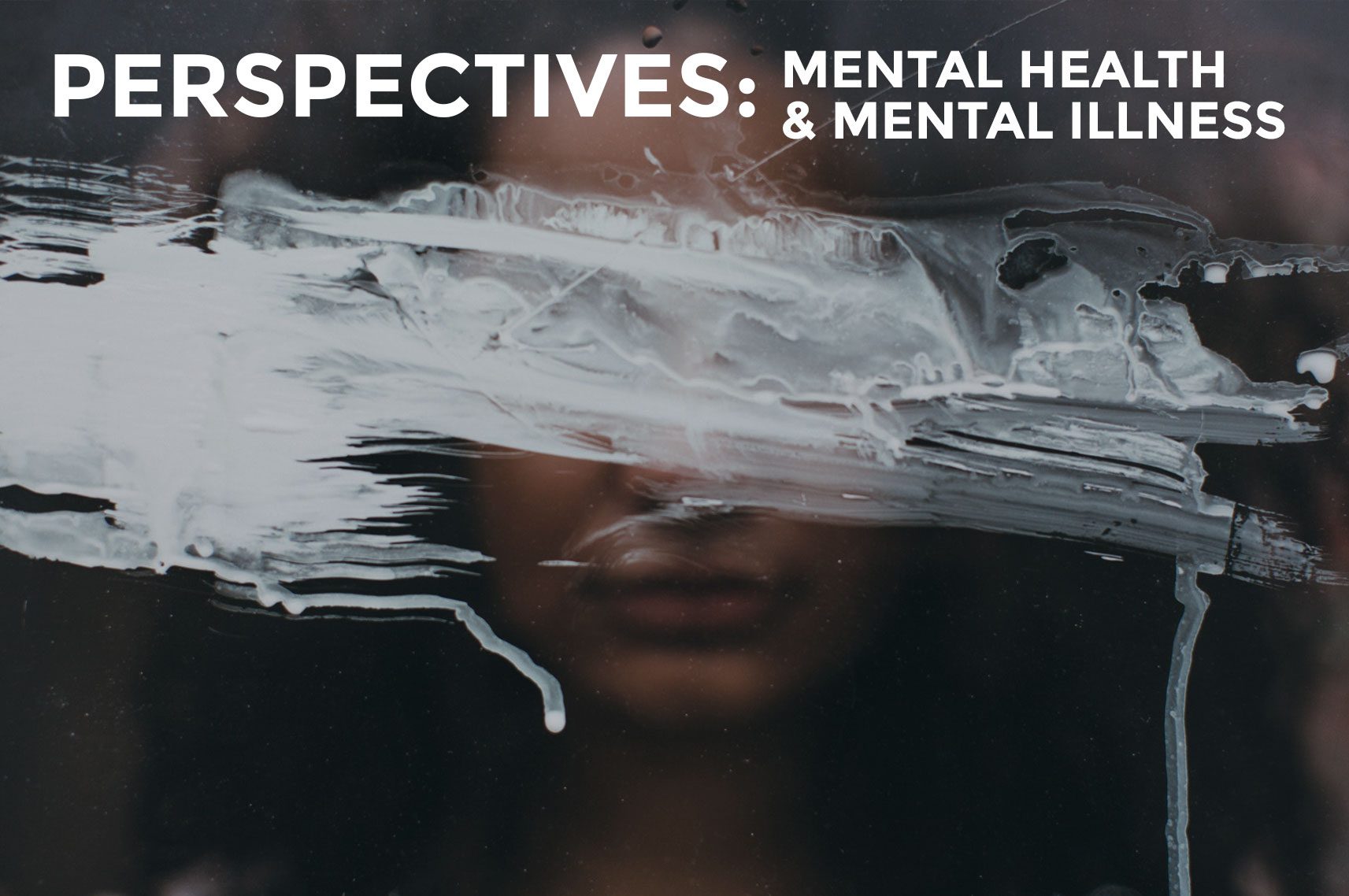 Yesterday marked the last day of May and with it the final day of Mental Health Awareness month. And while I’m glad there’s a month for it, the reality is that folks struggling with, or affected by mental health issues, or mental illness, or heck, just the average day-to-day battle keep sane in today’s climate doesn’t just go away at the end of May.
Yesterday marked the last day of May and with it the final day of Mental Health Awareness month. And while I’m glad there’s a month for it, the reality is that folks struggling with, or affected by mental health issues, or mental illness, or heck, just the average day-to-day battle keep sane in today’s climate doesn’t just go away at the end of May.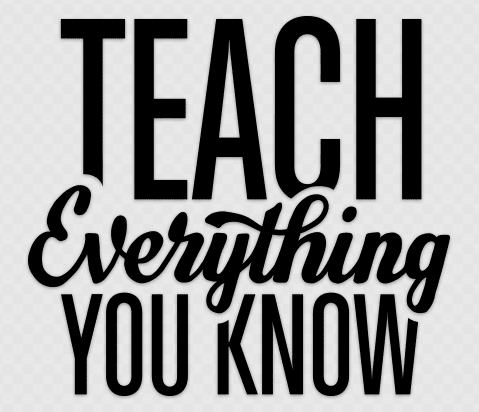
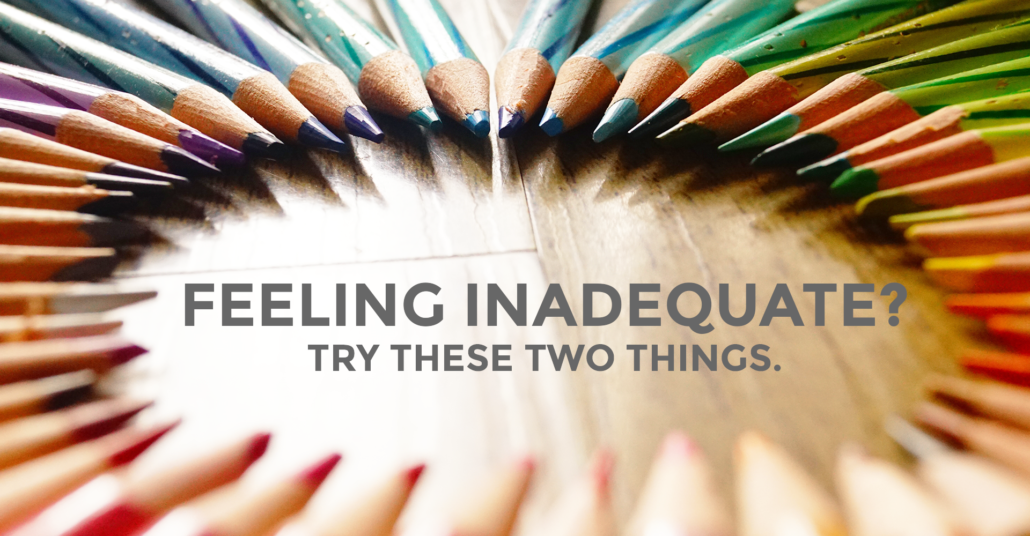
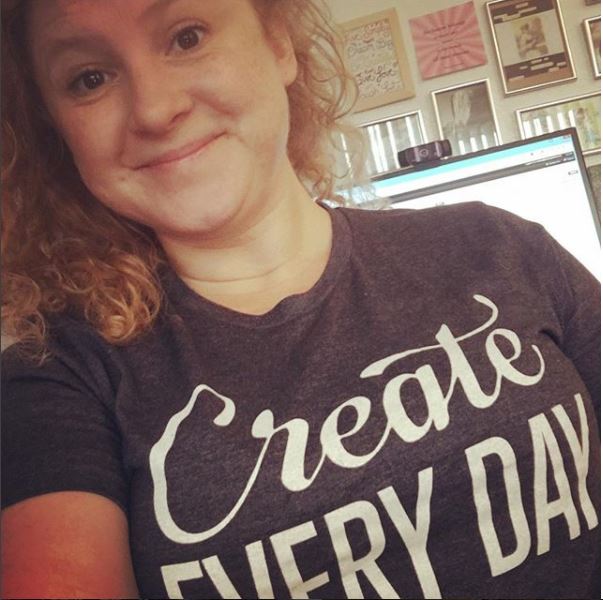
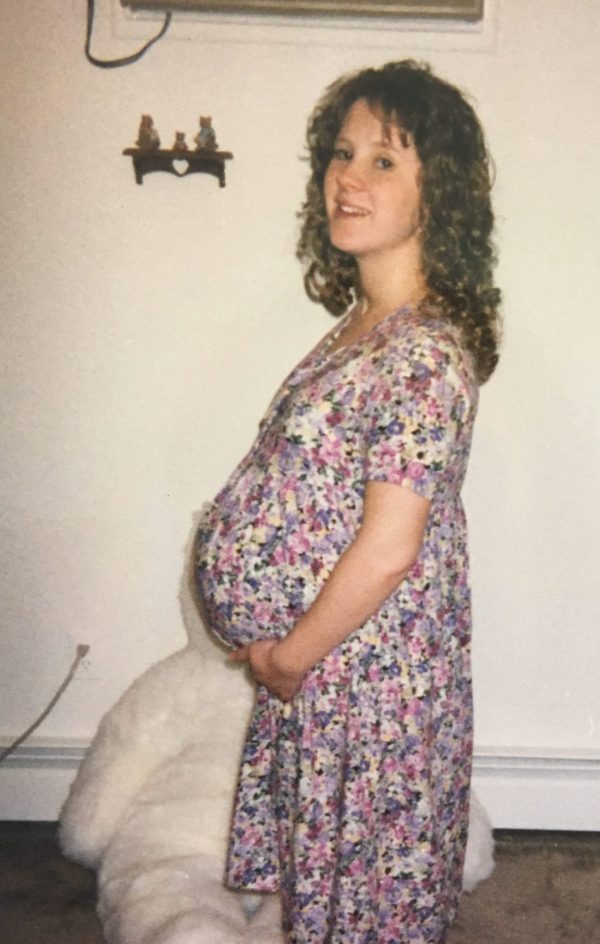
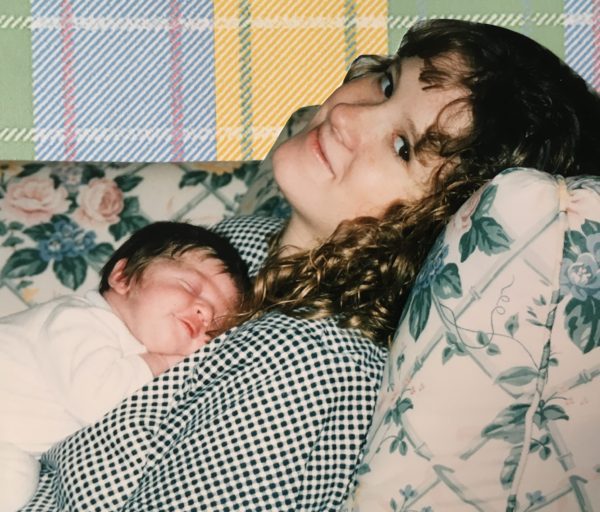
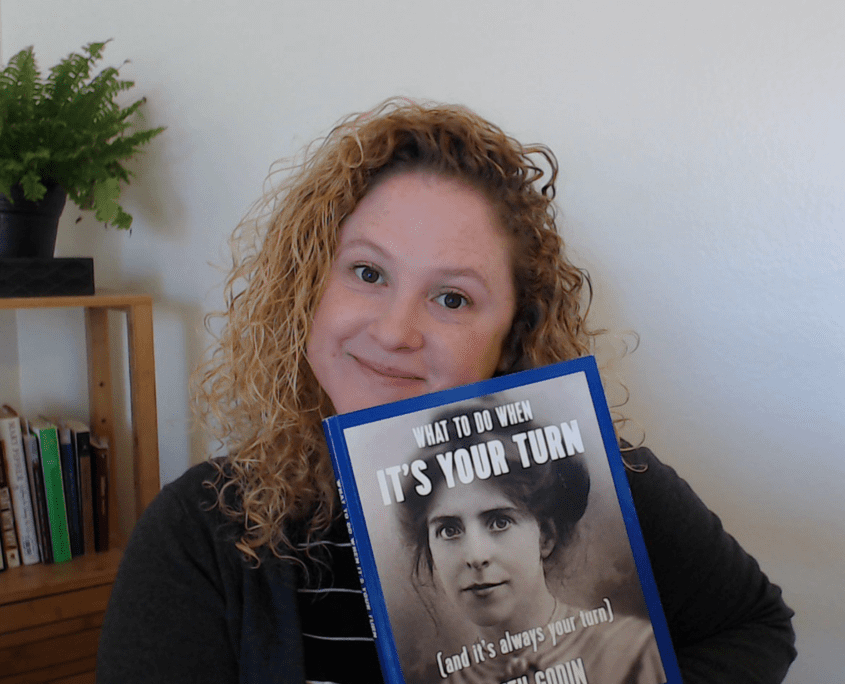
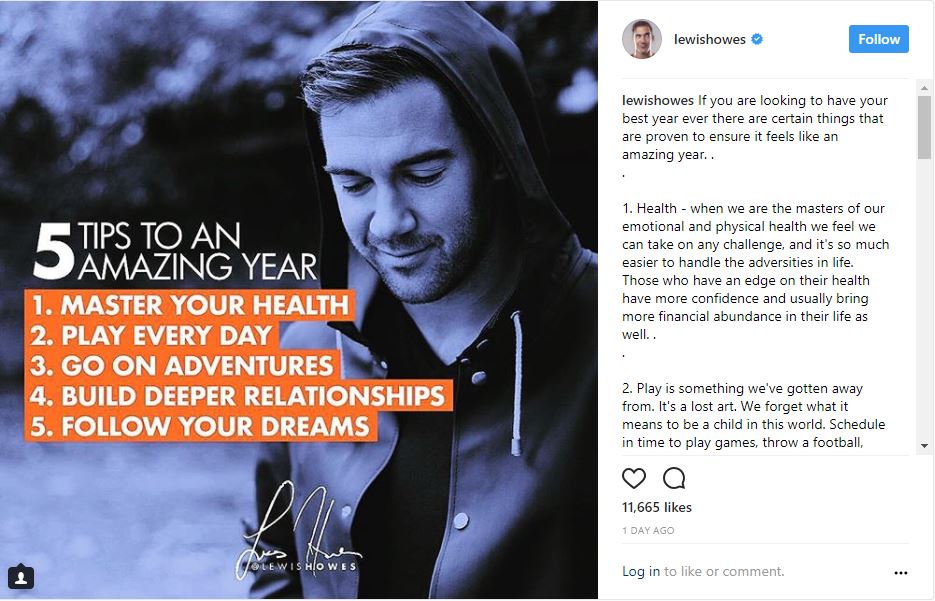
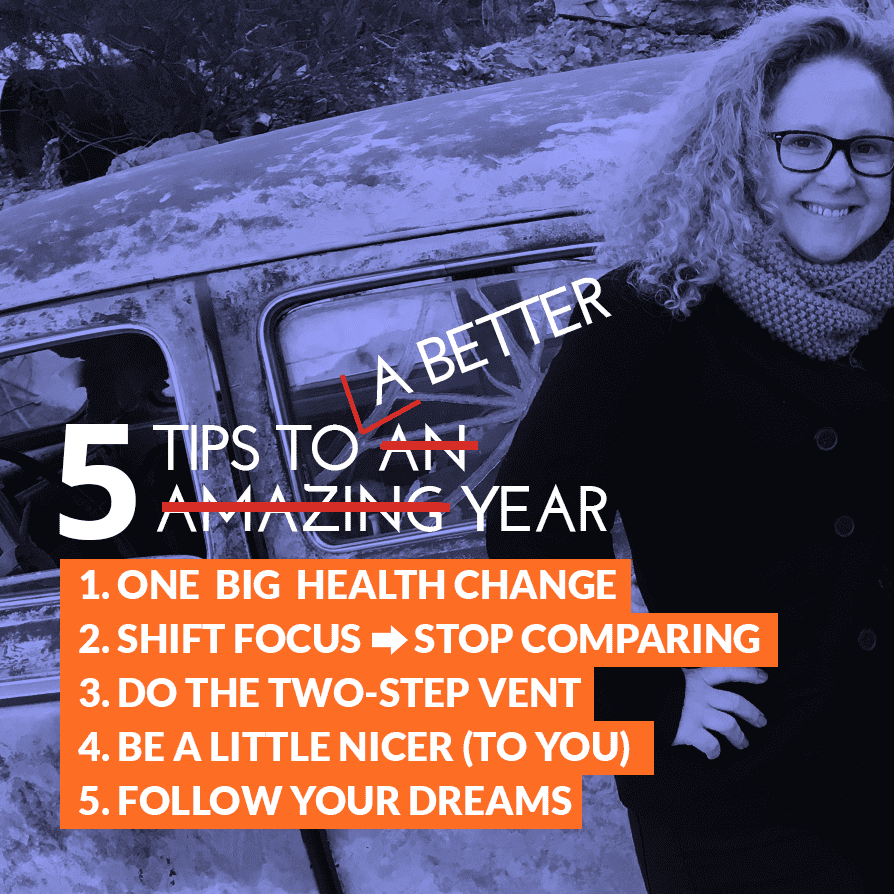
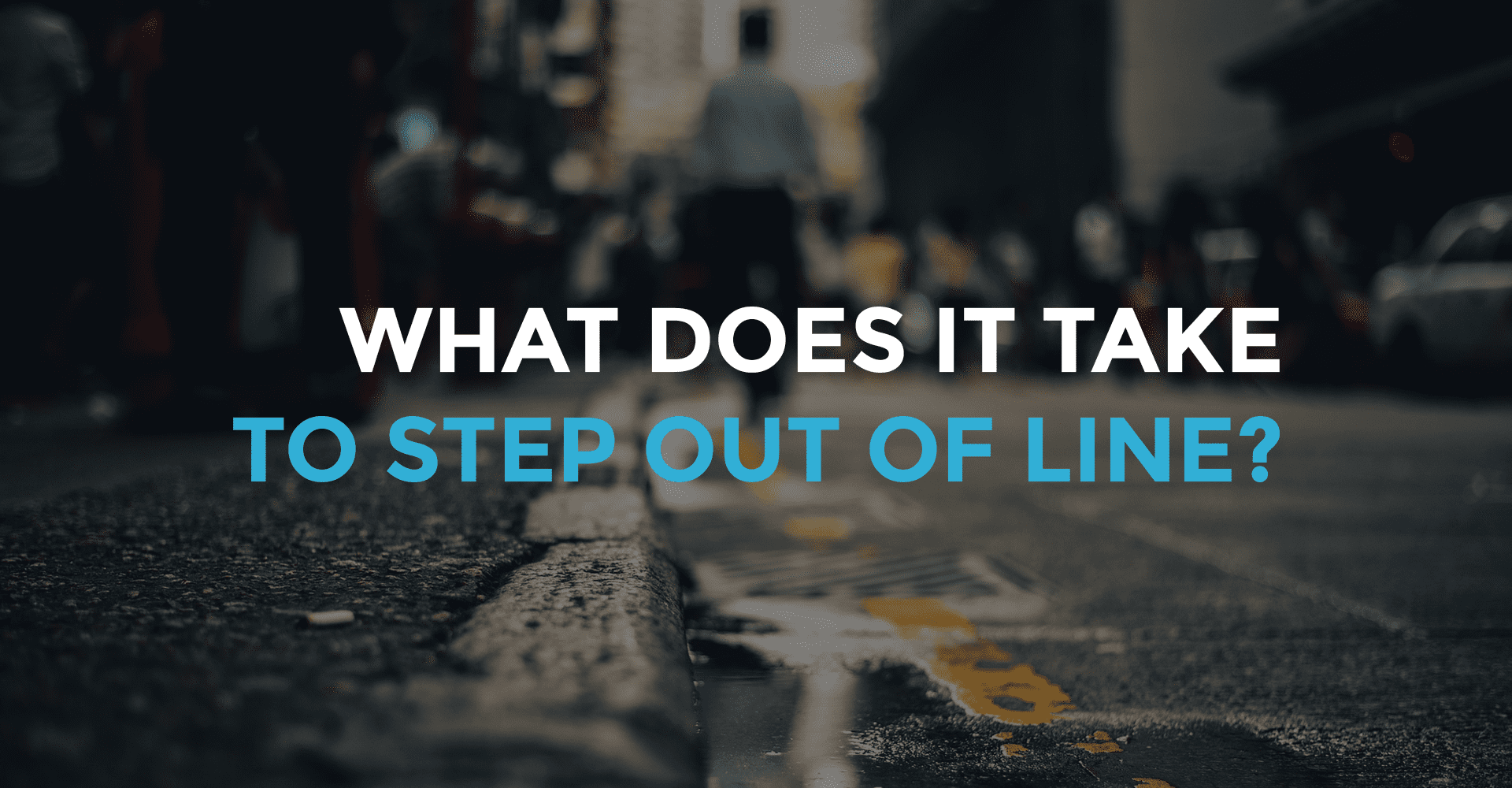
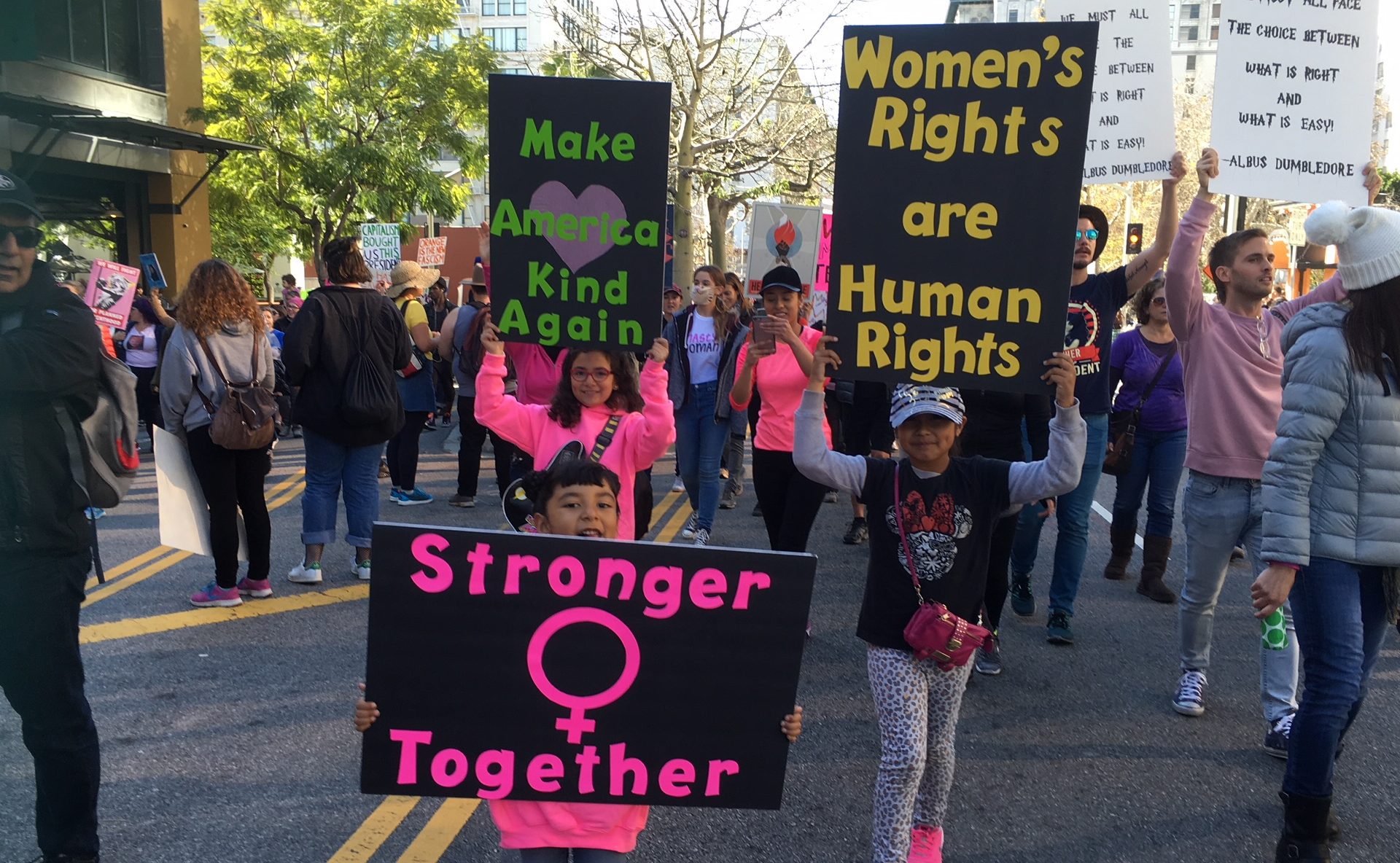
 We have to care about human rights as much as the megalomaniacs care about money and power.
We have to care about human rights as much as the megalomaniacs care about money and power.